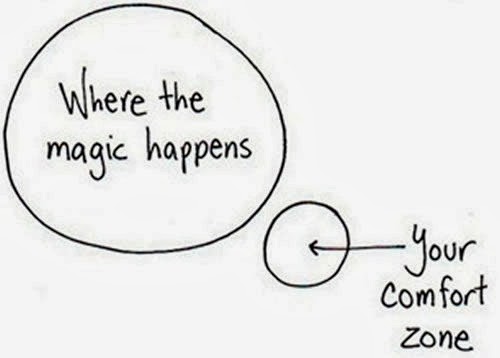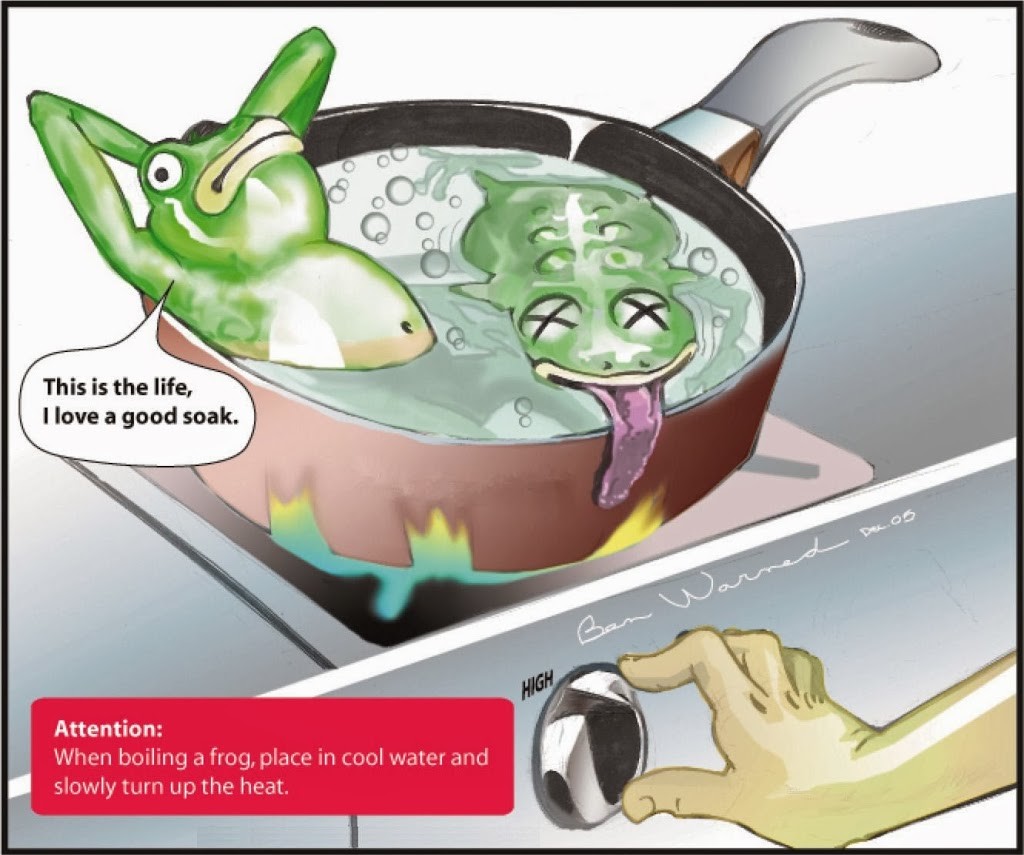Image from ahhh_poetry
Have you heard the story of the frog in a boiling pot?
Well, if you drop a live frog into a boiling pot of water, it would immediately leap out and save its life. If, however, our webbed protagonist sits comfortably in a pot of room temperature water which is slowly heated up, it would be slowly boiled to death.
Frog legs, anyone?
While I do not advocate cruelty to amphibians, we should be mindful of not becoming like the second frog in our lives.
When comfort quenches our spirit
The ultimate question we should ask ourselves is this: Are we leading our lives in ways that could lull us towards a dangerous stupor?
As creatures of habit, we find it extremely difficult to get out of a comfortable daily or weekly regime. There is a certain security and safety in doing what you have been doing, month after month, year after year, decade after decade.
Unfortunately, doing the same thing over and over again may destroy our drive, quench our spirit and kill our passion.
So how do we know when living in our comfort zones become a problem? Life coach Marla Tabaka suggests that there are several symptoms which we should take note of when this happens:
- Excessive stress
- Boredom
- Self-criticism
- Envy
- Anxiety about your situation
- Excuses- lots of them!
- A stagnant or failing business (or career)
If you have experienced some or all of the above, it is time to consider breaking out of the shackles of your comfort zone.
Less comfort = more growth
According to Life Hacker, escaping from your comfort zone could bring forth several benefits:
1) You’ll be more productive because comfort kills productivity. It does this by reducing our drive and ambition to do more or to stretch ourselves by learning new stuff.
2) You’ll be better prepared to deal with new and unexpected changes. By constantly taking small risks, and challenging ourselves to stretch further, we learn to live outside our comfort zones and can better cope with sweeping changes. This can be anything from a sudden job loss to a tragedy in the family.
3) You’ll find it easier to push the boundaries in future. As in all things, practice makes things easier over time. As we get accustomed to the state of “optimal anxiety” or “productive discomfort”, we become more willing to push further before our performance drops off.
4) You’ll find it easier to brainstorm and harness your creativity. Seeking new experiences and knowledge wires our brains in new ways. Doing so helps us to see beyond current biases. It also compels us to consider new and uncomfortable possibilities.
7 ways to break free
OK, so you are sold on the need to “break free”. How should you then do it?
Here, I found this post by A Lifetime of Wisdom pretty useful. Let me summarise its proposed steps below:
1) Embrace your fears in small steps
Take small steps to overcome your fears. For example, if you’re shy, you could start by saying “hi” to more people perhaps online in forums which are less intimidating than face-to-face. You can then slowly work your way towards initiating conversations at work or in school while de-sensitizing yourself to social situations.
2) Try something weird
Yes, this is certainly counter-intuitive. However, choosing to do something that is different and completely out of character for you could help edge you out of that comfort zone.
3) Make a new acquaintance
Exposing yourself to new people broadens your experiences, opinions and interests.
Other than meeting new people face to face, you could also pick up a biography of someone you know nothing about. Read a book by a new and unfamiliar author, watch a movie on a famous personality, or read a random topic on Wikipedia.
4) Take a friend with you
Things are often easier done with a buddy. Doing so provides greater accountability and commitment. However, choose carefully and be sure that your friend isn’t simply a security blanket for you when push comes to shove.
5) Educate yourself
Learning about your greatest fears can help you dispel those imaginary dangers. Ask people in the know, make use of Google, and read suitable books and blogs.
6) Awash your mind with positive memories
Reflect back upon the last time you took a leap of faith into the unknown. Re-experience how energised you felt, and how you overcame those difficulties then to reach a new level of heightened awareness, life and vigour.
While you may have your misgivings then (as you do now), it probably wasn’t that bad after all. Play back the good movies and not the nightmare scenarios!
7) Use other methods to pump yourself up
Doing something new isn’t easy or natural for the majority of us. Thus, it makes perfect sense for us to use various tools and aids to inspire us and spur us forward when doing so.
Use uplifting and motivational music to boost your adrenaline levels. Move your body in a new and more confident swagger. Visualise positive outcomes by closing your eyes and using your imagination. Do also consider guided meditation techniques and breathing exercises to calm yourself.
Discovering where the magic happens
It is never easy to leave a comfortable place in order to venture forth into risky new areas. Often, our natural instincts, honed by years of practice, would scream all kinds of discouraging messages at us to prevent us from making that critical jump.
While maintaining status quo is safer than venturing into the great unknown, it limits us from achieving our fullest potential. We mustn’t forget that we have but one life to live. Cowering in fear may keep us alive. However, it would also prevent us from truly thriving or discovering what our life’s work truly is.
To prevent this frightful scenario from occurring, we need to be brave. Let us commit today to stepping out of our comfort zones. Let us prod ourselves to take uncomfortable steps and unprecedented actions.
By doing so, we are better able to life life more fully, and abundantly, opening ourselves to wonderful new possibilities and unimaginably exciting opportunities. And that is where the magic truly happens.

Courtesy of The Start of Happiness

